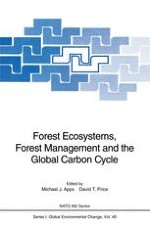1996 | OriginalPaper | Buchkapitel
Tropical forests and the global carbon cycle: estimating state and change in biomass density
verfasst von : Sandra Brown
Erschienen in: Forest Ecosystems, Forest Management and the Global Carbon Cycle
Verlag: Springer Berlin Heidelberg
Enthalten in: Professional Book Archive
Aktivieren Sie unsere intelligente Suche, um passende Fachinhalte oder Patente zu finden.
Wählen Sie Textabschnitte aus um mit Künstlicher Intelligenz passenden Patente zu finden. powered by
Markieren Sie Textabschnitte, um KI-gestützt weitere passende Inhalte zu finden. powered by
Tropical forests have an important role in the global carbon (C) cycle because of their existing large areal extent, high rates of deforestation, large C pool in vegetation and soil, and high rates of C emissions resulting from conversion to other uses (equivalent to between 22 and 37% of current fossil fuel C emissions) (Table 11.1). Tropical forests currently account for about 43% of the global forest area (Dixon et al. 1994), most of which is in tropical America (52%), followed by tropical Africa (30%) and tropical Asia (18%). They occur mostly as lowland formations where 88% are at an elevation of 1000 m or less. Within the lowlands, 47% are in the rain forest ecological zone, 38% in the moist deciduous zone, and 15% in the dry to very dry zone (Food and Agriculture Organization (FAO) 1993).
